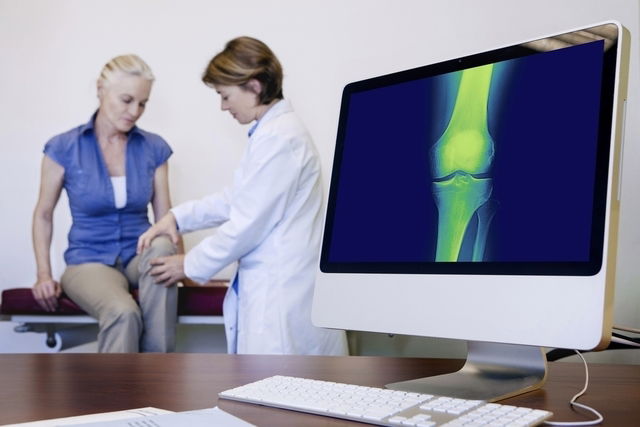Vitamin D deficiency can cause mood changes, fatigue, bone pain and cramps. Children with low vitamin D levels may experience Ricketts, an illness that affects healthy bone development and leads to delayed growth, weakness, bow legs and irritability.
Factors like obesity, reduced sun exposure, poor nutrient absorption in the body and decreased nutrient intake may play a role in having an increased risk for a vitamin D deficiency.
If you suspect you may have a vitamin D deficinecy, you should see a doctor for assessment and treatment, which usually involves increased sun exposure and vitamin D supplementation.

Low vitamin D symptoms
The common signs and symptoms of low vitamin D are:
- Delayed growth in children;
- Bowlegs in children;
- Enlarged bones in legs and arms;
- Delay in the appearance of baby teeth and tooth decay from early on;
- Osteomalacia or osteoporosis in adults;
- Bone weakness, which makes them more fragile to breaks, especially the back, hip and leg bones;
- Muscle aches;
- Feeling fatigued, weak and unwell;
- Bone pain;
- Muscle spasms.
People who have fair skin need around 20 minutes of unprotected sun exposure a day, while people with darker skin need at least one hour of direct unprotected sunlight, early morning or late afternoon.

Main causes
Lack of vitamin D can happen due to low intake of food that contains vitamin D, lack of proper sun exposure, because of excessive use of sunscreen, and due to darker skin tones. However, there are also certain conditions that may be linked to lack of vitamin D:
- Chronic kidney disease ;
- Lupus;
- Celiac disease;
- Crohn’s disease;
- Short bowel syndrome;
- Cystic fibrosis;
- Cardiac insufficiency;
- Bladder stones
If you have any of these diseases, your doctor should monitor your vitamin D and overall health status to assess whether you should supplement with vitamin D.
How to diagnose vitamin D deficiency
During an assessment, the doctor may assess for risk factors like reduced sun exposure, constant use of sunscreen, low intake of vitamin D rich foods. In older adults, vitamin D deficiency may be suspected in cases of osteopenia or osteoporosis.
A diagnosis of vitamin D deficiency is done through a blood test called 25-hydroxyvitamin D, and the reference amounts are:
- Less than 20 ng/ml - serious deficiency
- Between 21 and 29 ng/ml - slight deficiency
- From 30 ng/ml - adequate level
This blood test can be requested from a doctor or nurse practitioner, who will then assess your need for a vitamin D supplement.
Complications of vitamin D deficiency
Lack of vitamin D increases the risk of developing serious diseases that affect bones such as rickets and osteoporosis, but it also increases the risk of developing other diseases, such as:
- Diabetes;
- Obesity;
- High blood pressure;
- Rheumatoid arthritis
- Multiple sclerosis.
Sun exposure is important to prevent vitamin D deficiency because only 20% of the body’s daily need for this vitamin is achieved through diet. Adults and children with fair skin need 20 minutes of sun exposure to produce this vitamin, while darker-skinned people need about an hour of sun exposure.
Treatment options
Vitamin D deficiency can be corrected with oral intake of vitamin D, either through supplementation or dietary sources. Mild deficiency can be treated with diet and increased sun exposure as recommended by a doctor or registered dietitian to prevent the development of diabetes and obesity. A moderate to severe deficiency should use a combination approach of diet, sun and supplementation.
Dietary sources
Vitamin D can be obtained from food sources, such as salmon, oysters, eggs, sardines, and through the body’s internal production which is activated when the skin is exposed to the sun. Learn more about foods that are high in vitamin D that you can include in your daily diet.
Supplementation
The doctor may recommend you take vitamin D2 and D3 supplements if you live somewhere with low sun exposure and where vitamin D rich foods are not as accessible to the population. Pregnant women and babies under the age of one will be required to have a vitamin D supplement if a vitamin D deficiency has been confirmed.
Supplementing in case of deficiency should be done for 1 or 2 months, and after that time the doctor may request a new blood test to assess whether the supplement needs to be taken for longer. This is because excessive consumption of vitamin D is dangerous, as it may increase blood calcium levels excessively, which can also cause bone loss.
